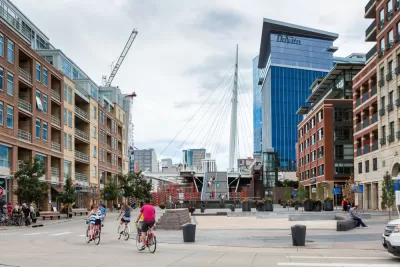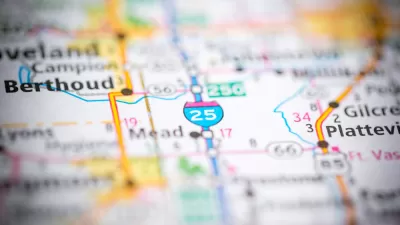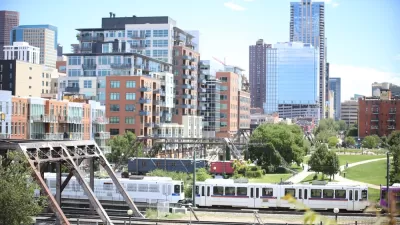A proposed transportation strategy could shift the state’s focus away from driving and toward incentivizing public transit use, walking, and biking.

“After decades of pouring billions of dollars into a transportation system that favors moving vehicles quickly above all else, the Denver region could see a significant funding shift away from road expansions and toward public transit, pedestrian and bicycle infrastructure” if a proposal before the board of the Denver Regional Council of Governments (DRCOG) passes, reports Nathaniel Minor for Colorado Public Radio.
The new plan would ax planned expansions of Interstate 25 and C-470 and cut or minimize similar widenings on smaller roads across the region. It would also move $900 million away from road expansions to fund climate-friendly transportation projects, including projects that would overhaul busy streets to help public buses move faster.
To reduce emissions, Colorado is planning for a shift to electric vehicles and renewable energy. “State officials and climate-minded legislators, urged along by clean transportation experts, are also trying to incentivize Coloradans to drive less by making buses, trains, walking and cycling safer and more convenient — and cutting highway expansions that would likely have attracted more drivers.”
The proposal calls for speeding up five bus rapid transit (BRT) projects, with a new completion date of 2030. These include “East Colfax in Denver and Aurora; East Colfax Extension between I-225 and E-470; Federal Boulevard; Colorado Boulevard; and State Highway 119 between Boulder and Longmont.”
The plan doesn’t eliminate all highway expansions, retaining plans for new toll lanes on Interstate 270, Interstate 25, and Interstate 70, as well as roughly a dozen arterial street expansions.
FULL STORY: Metro Denver set to drop I-25 and C-470 expansions as planners shape climate-minded transportation future

Planetizen Federal Action Tracker
A weekly monitor of how Trump’s orders and actions are impacting planners and planning in America.

Maui's Vacation Rental Debate Turns Ugly
Verbal attacks, misinformation campaigns and fistfights plague a high-stakes debate to convert thousands of vacation rentals into long-term housing.

Restaurant Patios Were a Pandemic Win — Why Were They so Hard to Keep?
Social distancing requirements and changes in travel patterns prompted cities to pilot new uses for street and sidewalk space. Then it got complicated.

In California Battle of Housing vs. Environment, Housing Just Won
A new state law significantly limits the power of CEQA, an environmental review law that served as a powerful tool for blocking new development.

Boulder Eliminates Parking Minimums Citywide
Officials estimate the cost of building a single underground parking space at up to $100,000.

Orange County, Florida Adopts Largest US “Sprawl Repair” Code
The ‘Orange Code’ seeks to rectify decades of sprawl-inducing, car-oriented development.
Urban Design for Planners 1: Software Tools
This six-course series explores essential urban design concepts using open source software and equips planners with the tools they need to participate fully in the urban design process.
Planning for Universal Design
Learn the tools for implementing Universal Design in planning regulations.
Heyer Gruel & Associates PA
JM Goldson LLC
Custer County Colorado
City of Camden Redevelopment Agency
City of Astoria
Transportation Research & Education Center (TREC) at Portland State University
Jefferson Parish Government
Camden Redevelopment Agency
City of Claremont





























